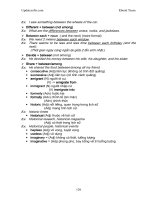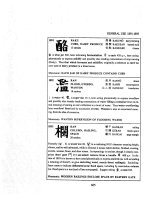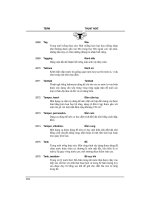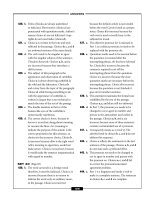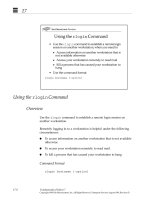Quantitative comparisons practice phần 10 potx
Bạn đang xem bản rút gọn của tài liệu. Xem và tải ngay bản đầy đủ của tài liệu tại đây (170.88 KB, 16 trang )
A: 3 hours and a half
B: X
AI: Z delivery boys deliver W pizzas in 3 hours and a half.
Z delivery boys deliver (W + 3) pizzas in X hours.
The best answer is B.
This is a simple reasoning problem, more pizzas delivered by the same number of
delivery boys would take more time to deliver and therefore X has to be bigger than
3.5.
11.
A: The time in minutes it would take Sandra to walk 10 miles
B: The time in hours it would take Christopher to walk 5 miles
AI: Sandra walks at a rate of 5 miles per hour while Christopher walks 2.5 miles per
one hour.
The best answer is A.
Read the columns carefully.
Column A is the time in minutes and column B is in hours.
Column A = 2 hours = 120 minutes.
Column B = 2 hours.
120 > 2 and therefore column A is greater than column B.
Note: people are gonna curse me for that question.
12.
A: Time elapsed from 14:12 to 19:03
B: 3 hours and 51 minutes
The best answer is A.
Column A: from 14:12 to 15:00 its 48 minutes, from 15:00 to 19:00 its 4 hours and 3
more minutes to 19:03. Altogether, it’s 4 hours and 51 minutes.
Column A is greater by one hour exactly from column B.
13.
A: The probability of getting an even number in a throw of a dice
B: The probability of getting a number greater than 2 in a throw of a dice
The best answer is B.
There are 6 options altogether; 3 of them are even numbers: 2, 4 and 6 and therefore
the probability is 3/6 = ½.
There are 4 numbers greater than 2: 3, 4, 5 and 6 and therefore the probability here is
4/6 = 2/3, which is greater than ½ and so column B is greater than A.
14.
A: Timothy’s height
B: Avery’s height
AI: David is 3 inches taller than Timothy and 4 inches taller than Avery
The best answer is A.
Let X be the height of David.
Timothy is X – 3 and Avery is X – 4, which means that Timothy is taller than Avery
and column A is greater than column B.
15.
A: The distance that Martha traveled in kilometers
B: The distance that Bertha traveled in miles
AI: Martha traveled 6 miles and Bertha traveled 9.6 kilometers
Assume that 1 mile is 1.6 kilometers.
The best answer is A.
Martha traveled 6 miles, which is (6 x 1.6 = 9.6) kilometers.
Bertha traveled 9.6 kilometers, which is 6 miles.
9.6 > 6 and therefore column A is greater.
16.
A: The number of minutes that the machine was operational
B: 1440N
AI: A food processing machine was operating for N Days
The best answer is C.
1 day has 24 hours, which is (24 x 60 = 1440) minutes.
The total number of minutes is 1440N.
The columns are equal and the right answer is C.
17.
A: Frank’s income
B: Susan’s new income
AI: Before Susan quit her old job, her income was 35% more than Frank’s income.
After Susan changed jobs, her new income is 35% less than her old income.
The best answer is A.
Since no numbers were given, plug in $100 as Frank’s income.
Susan old income was 35% more than $100, thus $135.
Susan’s new income is 35% less than $135, which is 75.87$
100
8775
135$
100
65
.
We can see that her new income is less than Frank’s income and so column A is
greater than column B.
18.
A: The cost of Z erasers
B: ZX/Y
AI: Y erasers cost X dollars
The best answer is C.
If Y erasers cost X dollars, each single eraser costs X/Y dollars.
We want to know how much do Z erasers cost, multiply Z by the cost of one unit. Z
erasers cost ZX/Y and so column A = column B.
19.
A: Matt’s speed from work back home
B: Matt’s speed from home to work
AI: Matt goes from home to work in 5 minutes and returns home from work in 25
minutes.
The best answer is D.
The question lacks an important detail- we have no way of knowing if Matt goes
through the same path from home to work and from work home or if he has a ride in
one direction.
It is indeterminable and so the right answer is D.
20.
A: Number of feet in 999 yards.
B: Number of minutes in two days
The best answer is A.
Column A: There are 3 feet in every yard and therefore there are
999 x 3 = 2997 feet.
Column B: There are 24 x 60 = 1440 minutes in one day and therefore there are 2880
minutes in two days.
Column A is greater than column B.
21.
A: The length of the longest stick that can fit inside a box whose internal dimensions
are 12 cm by 4 cm by 3 cm
B: 12 Cm
The best answer is A.
This is a hard question to figure out with out a drawing so draw a small sketch of a
box:
If you try to put the largest stick in the box, you’ll put it from corner to corner and
thus you form two right triangles: one with sides of 3,4, 5 and the second is a one with
5, 12 and X. Where X is the size of the stick.
Using the Pythagoras principle, X = 13125
22
Cm.
Column A is greater than column B.
Another way to solve this question is by intuition, if one of the sides is 12, you can
always put the stick diagonally and therefore a larger stick can be placed in the box.
22.
A: Betty’s average speed, in miles per hour
B: 40
AI: Betty drove 210 miles from 8:00 A.M. to 13:15 P.M.
The best answer is C.
Betty drove from 8:00 to 13:15, which are exactly 5 hours and a quarter.
4
3
12
Speed = Distance / Time
Speed = 210 / 5.25 = 40 miles per hour.
Column A = column B = 40 miles per hour.
23.
A: The smallest number greater than 300 in the sequence
B: 330
AI: The first term of a sequence is one. Starting with the second term, each term is
two less than 4 times the previous term.
The best answer is A.
Follow the sequence carefully:
The first is 1, the second is 4(1) – 2 = 2.
The third term is 4(2) – 2 = 6.
The fourth term is 4(6) – 2 = 22.
The fifth term is 4(22) – 2 = 86.
The fifth term is 4(86) – 2 = 342. Stop here since we passed 300.
Since 342 is greater than 330, column A is greater than B.
24.
A: The cost of M guitars in dollars
B:
100
100 PMQM
AI: At Jim’s guitar centre, a guitar costs Q dollars and P cents
The best answer is A.
One guitar costs Q dollars + P/100 dollars.
M guitars cost
100
100
100
PMQMP
QM .
We can see that the expression in column B has –PM instead of PM and therefore it is
smaller than the expression in column A.
25.
A: The ratio between the number of people who jump rope to the number of people
who only ran
B: 1/2
AI: At the city sports day, 600 people jumped rope, 400 ran and 200 did both
The best answer is A.
(600 + 200 = 800) people jumped rope.
400 people only ran.
The ratio between the two groups is 800/400 = 2.
2 > ½ and so column A is greater than column B.
26.
A: The units’ digit of 11
5
B: The units’ digit of 5
11
The best answer is B.
Column A: 11 by any power is always a number where the units’ digit is 1. Try some
numbers: 11
1
= 11, 11
2
= 121 and so on.
Column B: 5 by any power is always a number where the units’ digit is 5.
Try some numbers: 5
2
= 25, 5
3
= 125 and so on.
Column A = 1 and column B = 5, B is the answer.
1.
A: The area of ABC.
B: 10.
AI (additional Information): AB = AC, AD = 8.
The best answer is D.
In order to know if the area of the triangle is bigger or smaller than 10, you need to
know the length of the base, which is not given and therefore the relationship cannot
be determined.
2.
A: The area of the inner circle.
B: The area of the shaded region.
AI: the Square ABCD is inscribed in the large circle.
The small circle is inscribed in the square ABCD.
The best answer is A.
Let’s define X as the length of the radius of the large circle.
According to the Pythagoras principle, the ratio between the sides of the square to the
diagonal is 1:1: 2 . If the diagonal is equal to 2R then the area of the square is equal
to 2R
2
. The area of the shaded region is equal to )2(2
222
RRR .
The area of the smaller circle is equal to
)2()2(
22
RR
.
Since
22
, the answer is B.
3. AI: Line Q goes through (1, 2) and (9, 8).
Line W is perpendicular to Q.
A: The slope of line Q.
B: The slope of line W.
The best answer is A.
Without drawing the lines, we know that line Q has a positive slope and since line W
is perpendicular to Q, it has a negative slope. And therefore the answer is A.
If drawing a quick sketch helps, do so, but always remember that time is running.
4.
A: 234 + 675 + 898.
B: 324 + 756 + 989.
The best answer is B.
This question can be solved quickly by adding the numbers, but a quicker way is to
think.
B
A
C
D
D
C
B
A
You can see that each of the numbers in column B is bigger than those in column A
and therefore B is greater.
5.
A: 100Z
B: 100/Z
AI: Z > 0.
The best answer is D.
Take Z = 2, A = 200 and B = 50.
Take Z = ½, A = 50 and B = 200.
And therefore you cannot determine which column is greater.
6.
A: (X + Y)
2
B: X
2
+ Y
2
AI: XY is a positive integer.
The best answer is A.
A = X
2
+ 2XY + Y
2
and B = X
2
+ Y
2
. Subtract similar variables from each side and
the question comes to: is XY > 0, if so than A is the answer. Since the additional
information stated that XY is positive, the answer is A.
7.
A: A
2
+ B
2
B: (A – B)
2
AI: A < 0, 0 < B < 1.
The best answer is B.
A = A
2
+ B
2
and B = A
2
+ B
2
-2AB. If AB is positive then the answer is A, else the
answer is B. According to the additional information, A is negative and B is positive
and therefore AB is negative. The answer is B.
8.
A: (X + Y)
2
B: (X – Y)
2
AI: 0,
BA
The best answer is D.
The difference between the two columns is the presence of the variable XY. If it’s
positive then A is greater and if it’s negative B is greater but if it’s equal to zero the
columns are equal. Since the additional information is not distinct (A can be also
zero), the answer cannot be determined.
9.
A: 3X
B: 3
X
AI: X < 0
The best answer is B.
Since X is negative, 3X is negative, whereas 3
X
is positive. Try out a number: X = -2.
A = -6 and B =
3
-2
= 1/9 and therefore B is greater.
10.
A: 4XY
B: (XY)
4
AI: X and Y are integers
The best answer is D.
Pick up numbers: X = 2, Y=2. A = 16 and B = 256.
Take X=1, Y=1: A = 4 and B = 1. Since picking up different numbers that fit the data
resolves in a different answer, the answer cannot be determined.
11.
A: X
B: 5
AI: X + Y = 20, Y - X = 10.
The best answer is C.
Take the given equations and add them, the result is Y = 15. Now find X = 5.
The columns are equal.
12.
A: X
B: Y
AI: 14X -16Y = 27, 81 – 42X = -48.
The best answer is D.
In order to determine which column is greater we need two equations.
If you multiply the first equation by 3 and you play with it a little, you’ll get the
second equation and therefore we lack an equation to determine the answer.
13.
A:
2
25
24
B:
3
24
25
The best answer is A.
Column B can be written as
3
25
24
. Since both A and B are fractions, the power of
the fraction will determine the answer. The higher the fraction the smallest the
number and therefore A is larger.
14.
A:
3
7
6
B:
2
8
7
The best answer is B.
A =
343
216
7
6
7
6
3
3
3
.
B =
64
49
8
7
2
. Since the numbers are not easy to work with, let’s be rough.
A is close to 220/340, which is 11/17 and B is close to 50/65, which is 10/13.
10 divided into 13 parts is a lot bigger than 11 divided into 17 parts and therefore B is
greater. Remember, you don’t need to solve the numbers, just to compare.
15.
A:
6
7
6
B:
7
7
6
The best answer is A.
Don’t open the parenthesis, just compare.
Both A and B are fractions, the one in A is powered by a smaller number and thus the
result is bigger. The rule in fractions is so, the greater the power, the smaller the
number.
16.
A: 9P
B: P
2
AI: 2 < P < 4
The best answer is A.
Find the highest and the lowest values of A and B.
A is between 18 and 36 while B is between 4 and 16.
We can see that for every P, the value of column A is greater than that of B.
17.
A: P
B: 27
AI: Q + P = 27, Q – P = 27.
The best answer is B.
Adding the equations will give: Q = 27 and therefore P = 0.
18.
A: Z
B: M
AI: 27
3
3
3
2
ZM
MZ
The best answer is D.
Rewrite the expression: 3233327
3
3
3232
3
2
MZ
MZZMMZ
ZM
MZ
.
M = 2Z – 3. Now pick up numbers, take Z = 1 M = -1.
Now take, Z = 3 M = 3. Since the answer is not distinct the answer is D.
19.
A: X
B: Y
AI: 256
2
4
25
3
YX
YX
The best answer is A.
Rewrite the expression:
822526
25
26
25
3
222
2
2
2
4
YXYXYX
YX
YX
YX
YX
X-Y – 2
=8.
And therefore X = Y + 10, thus X is greater than Y.
20.
A: Y
B: 2
AI: 8Y
3
= 128Y
The best answer is D.
IF 8Y
3
= 128Y then Y
2
= 16 Y = 4 or Y = -4. Since 2 is bigger than -4 and smaller
than 4 the answer is D.
21.
A: Z
B: 7
AI: 7Z
3
= 175Z
The best answer is B.
If 7Z
3
= 175Z then Z
2
= 25 and so Z = 5 or Z = -5. Since 7 is bigger than both, column
B is greater.
22.
A: The distance between X and Y.
B: The distance between Y and Z.
AI: X + Y = 4 + 2Y, Z = X + 10.
The best answer is D.
This question has a little trick, no one said that the points are on a straight line.
From the data we know that the distance between X and Y is 4 and that the distance
between X and Z is 10. We cannot conclude that the distance between Y and Z is 6
because we were not told that X, Y and Z are on a straight line.
1.
A: 3.
B: The average (arithmetic mean) of X, Y and Z.
AI: X + Y = 6
Y = 8 – Z
Z = 4 – X
The best answer is C.
If you add all three equations, you’ll get 2X + 2Y + 2Z = 18, divide both sides by 6 to
get: (X + Y + Z)/3= 3, which is exactly the average.
2.
A: X
B: Y
AI: 2X = 8 + 3Y
Y = 2X
The best answer is A.
Substitute 2X for Y in the first equation to get: 2X = 8 + 6X X = -2, Y = -4 and
therefore X is greater than Y.
3.
A: X
B: -1
AI: 2X = 10 - 3Y
Y = -4X
The best answer is C.
Substitute -4X for Y in the first equation to get: 2X = 10 + 12X X = -1 and
therefore the answer is C.
4.
A: X
B: 6
AI: 5X + 3 < 4X + 10
The best answer is D.
5X + 3 < 4X + 10 can be written as X < 7 and therefore X can be equal to 6 or even
smaller than 6 and therefore the answer cannot be determined and the answer is D.
5.
A: 13
B: Z
AI: 27 – 13Z > 40 – 14Z
The best answer is B.
The additional information can also be written as Z > 13 and therefore Z can be 14
and up, thus column B is greater.
6.
A: X
B: Y
AI:
13
65
2
2
YX
The best answer is D.
The expression can be simplified:
1010
13
65
2
2
YXYX
YX
.
Now, we can see that the answer cannot be determined because of the 10 supplement
in the right wing of the inequality. X is only smaller if you add 10 to Y and therefore
the answer is not clear from the data given.
7.
A: 49/14
B: The average (arithmetic mean) of G and H.
AI: G + 2H = 15
H – 2G = 10
The best answer is C.
Multiply the first equation by two and add the second equation to get: 5H = 30 +10
Y=8 and X= -1. The average of X and Y is 3.5, which is equal to 49/14 or 7/2.
8.
A: The average (arithmetic mean) of a, b, c, d and e.
B: c.
AI: a, b, c, d and e are 5 consecutive numbers.
The best answer is C.
By definition, the average of an odd amount of numbers is the median one and
therefore c, which is the median among the 5, is the average of all the numbers.
9.
A: 25.
B: The average (arithmetic mean) of 5, 12, 14, 24 and 65.
The best answer is A.
Find the average of the 5 given numbers. Average = (5+12+14+24+650/5 = 120/5 =
24.
Column A is greater and therefore the answer is A.
10.
A: X
B: Y
AI:
Y
X
1
2
1
X and Y are negative integers.
The best answer is B.
Multiply both sides by XY to get: Y – 2XY = X Y – X = 2XY, which is a positive
number. We see that the difference between Y and X is a positive number and
therefore Y is greater than X.
Word problems
11.
A: Mike’s age in two years
B: John’s age two years ago
AI: Mike is twice as old as he was 14 years ago
John is one third as old as he will be in 12 years
The best answer is A.
Put the words into variables. Let M be the age of Mike today and J as the age of John
today. We can write two equations: M = 2(M – 14) M = 28.
J = (J + 12)/3 J = 6.
A= 30 and B = 4 and therefore Column A is greater.
12.
A: Kevin’s age today.
B: Val’s age today.
AI: Kevin is three times older than he was 16 years ago.
Val is half as old as he will be 10 years from now.
The best answer is A.
Replace the words with variables. Let K be Kevin’s age today and let V be Val’s age.
We can write two equations: K = 3(K – 16) K = 24.
2V = V + 10 V = 10.
A=24 and B=10 and therefore the answer is A.
13.
A: The amount that Rachael saves every month.
B: The amount that Rachael spends every month.
AI: Rachael spends one fifth of her monthly allowance on new cloths and one third of
the rest on driving lessons. The rest, Rachael saves in a savings account.
The best answer is B.
Rachael spends 1/5 + (1/3)(4/5), which is (1/5 + 4/15 = 7/15) of her allowance each
month. The rest, which is (1 – 1/5 - 8/15 = 4/15) she saves up. 7/15 > 4/15 and
therefore the answer is B.
14.
A: Money Travis spends on his Children’s education.
B: Money Travis spends on basic necessities.
AI: Travis deposits 40% of his salary in a trust fund and 20% of the rest he spends on
basic necessities. The rest of the money goes to his children’s education.
The best answer is A.
Travis deposits 2/5 of his salary and (1/5)(3/5), which is 3/25, goes to basic
necessities.
The rest of the money, which is (1 – 2/5 – 3/25 = 12/25), goes to his children’s
education.
A = 12/25 and B = 3/25 and therefore the answer is A.
15.
A: 50
B: The number of years until Laura will be 5 times as old as she is now.
AI: In 10 years, Laura will be twice as old as she is now.
The best answer is A.
Define L as the age of Laura today. Write the equation: 2L = L + 10 L = 10.
If today she is 10, in 40 years she will be 50, which is 5 times as old as she is now.
40 < 50 and therefore the answer is A.
16.
A: 22
B: The number of years until George will be twice as old as he is now
AI: In 8 years from now, George will be one and a half as old as he was two years ago
The best answer is C.
Let G be the age of George now. Write the equation: G + 8 = 1.5(G – 2) 0.5G = 11
G = 22. In 22 years, George will be twice as old as he is now. A=22 and B=22 and
therefore the answer is C.
17.
A: The number of 4$ coins that Owen used.
B: The number of 7$ coins that Owen used.
AI: Owen is playing a board game where there are only 4 and 7 dollar coins.
Owen paid the cashier $100 with $4 and $7 coins only.
The best answer is D.
Let X represent the number of $4 coins that he used and Y as the number of $7 coins.
We can write the equation: 4X + 7Y = 100.
There are only two solutions to this equation which are integers, X = 18, Y = 4 and X
= 4, Y = 12. A distinct answer cannot be determined and therefore the answer is D.
18.
A: The number of milk cartons that Erika used.
B: The number of loafs of bread that Erika used.
AI: In Weerky, people still trade goods. Two milk cartons are worth one fifth of a
sheep and three loafs of bread are worth one eighth of a sheep. Erika traded milk
cartons for half the value of the sheep and the other half with loafs of bread.
The answer is B.
The question is quite easy although there is much data.
One milk carton is worth 1/10 of a sheep.
One loaf of bread is worth 1/24 of a sheep.
Half a sheep was bought with milk, thus 5 milk cartons.
The other half was bought with bread, thus 12 loaf of bread and therefore B is the
answer.
19.
A: The number of 3 eggs cartons that Alf used.
B: The number of 4 eggs cartons that Alf used.
AI: Alf made a cake with 14 eggs using 3 and 4 eggs cartons only.
The best answer is
We need to find a combination of 4 and 3 that will resolve in 14.
The only combination will be 3+3+4+4 = 14 and therefore the answer is C.
